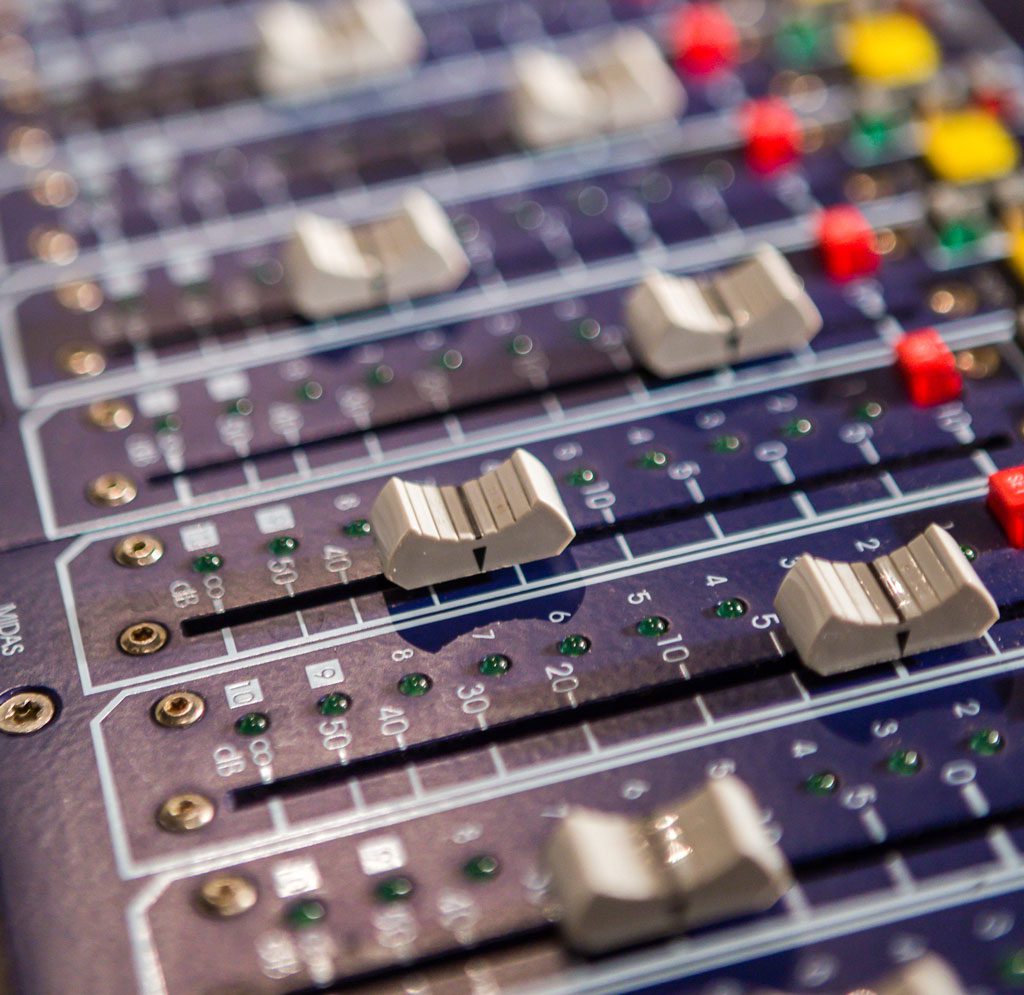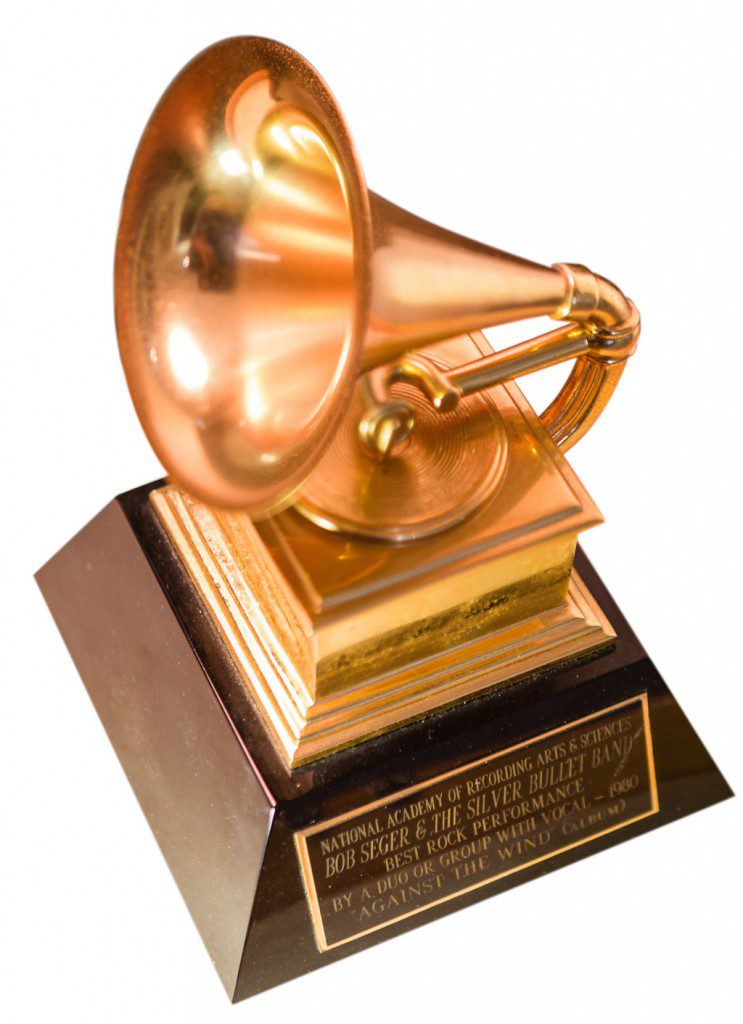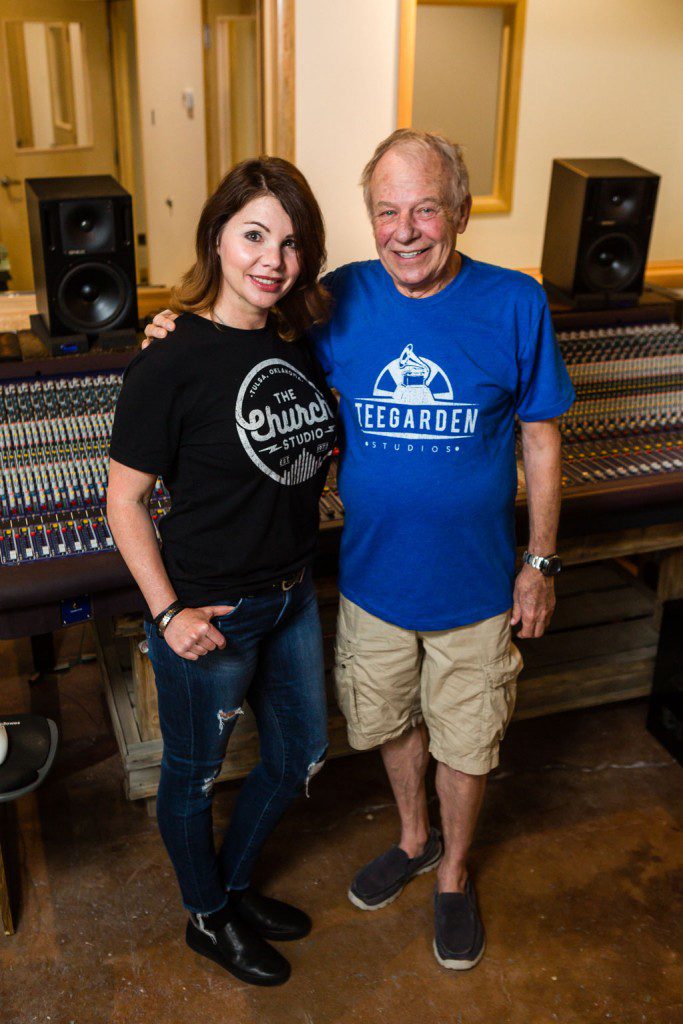
[dropcap]The[/dropcap] way Grammy-winning drummer David Teegarden tells it, he was driving down Tulsa’s Third Street one day, toward the building that was to be the home of his new recording facility, when he passed a group of people standing outside the fabled Church Studio. Atop the steps, a woman spoke to the crowd.
“I knew that someone had bought the Church,” Teegarden says, “and I thought, ‘This is my chance. I can find out what’s going on.’”
So he pulled up, parked, and when the opportunity presented itself, introduced himself to the new owner, Teresa Knox, the woman who’d addressed the group.
“I asked her, ‘What are you going to do with this place?’ I was hoping she’d say it was going to be a rest home or a hotel or something,” Teegarden laughs. “But she said, ‘Oh, we’re going to restore it as a recording studio.’
“We were standing on the steps at the time, and I said, ‘See that little building down there, about a block and a half away?’ She said, ‘Yeah.’
“I said, ‘That’s what I’m doing.’”
At that moment, a serious rivalry could’ve been hatched between one of Tulsa’s most famous musicians and the new owner of a legendary Tulsa studio, both setting up shop within a couple of blocks of one another.
Instead, it was just the opposite.
“She immediately ignited with enthusiasm,” Teegarden says. “‘Oh,’ she said, ‘that’s great. What are you going to call it?’ And we struck up a great conversation and relationship. It wasn’t a day or two later that she was texting me with suggested logos for my studio. I picked one of ’em, we added a Grammy to it [acknowledging his award for “Against the Wind” when he was with Bob Seger’s Silver Bullet Band], and within a day she had it up on the internet.”
Knox, with a chuckle, adds, “I think that marketing and branding are so important and so powerful, and if we’re going to have our own little studio row here on Third Street, we both need to look good.”
She even talked Teegarden into renaming his new place. It was formerly known as Natura Digital, which referred to its old location outside the small town of Natura, about 40 miles south of Tulsa. With the move to Third Street, it’s now simply Teegarden Studios.
“She said, ‘That’s what you’ve got to call it,’ and I said, ‘Yeah, I guess you’re right,’” Teegarden says. “For some reason I was funny about not wanting to get my name out there.”
Clearly, Knox – founder of Community Care College, Clary Sage College and Oklahoma Technical College, among other achievements – is a believer not only in her hometown, but also in the maxim about how a rising tide lifts all boats. In her efforts to do that for Tulsa’s music community, she draws inspiration from the city’s recently deceased Rock and Roll Hall of Famer Leon Russell, who originally turned the old church building into a recording studio in the spring of 1972.
“My older brother Larry was a huge Leon Russell fan,” she says. “He had his albums, and I remember him talking about the Church Studio, what Leon was doing, what Leon brought to Tulsa’s musicians and the music scene.
“I did not know Leon personally. I never went to the Church. Everything I knew, or I thought I knew, came from a Tulsan’s perspective, from a music lover and listener. I’ve always followed Leon’s career, and all the boys from here in Tulsa. I just loved what they were doing. I was never in the crowd or anything.
“However, when I was in my early 20s, I did get a job at the Sunset Grill. I was so enamored of these guys and the successes they’d had, and that was my initial connection with a lot of them.”
The original Sunset Grill, in Tulsa’s Brookside district, hosted live shows from a lot of well-known Tulsa performers – including Teegarden, who played there regularly with the Bill Davis Band – as well as many other acts from all across the country. Its heyday came in the ’80s, a few years after Russell had left Tulsa for the West Coast following a disagreement with producer Denny Cordell, his partner in the Church Studio-based Shelter Records. Several of the acts that had signed with Shelter came from Tulsa, including J.J. Cale, the Dwight Twilley Band, the Gap Band, and Russell himself. Many other bands and solo acts did sessions in the building that never saw the light of day, including Davis’s aforementioned group, who got in there at the very beginning.
 “[Drummer] Chuck Blackwell, who had been playing with Leon, came in to one of the clubs where we were playing and said, ‘Hey, Leon’s just about got all the electrons hooked up and going at the Church. You guys need to come in and do some recording.’ So we did,” Teegarden says. “I think we recorded almost an album’s worth of material. God only knows where that stuff is. I think I have copies of it somewhere.”
“[Drummer] Chuck Blackwell, who had been playing with Leon, came in to one of the clubs where we were playing and said, ‘Hey, Leon’s just about got all the electrons hooked up and going at the Church. You guys need to come in and do some recording.’ So we did,” Teegarden says. “I think we recorded almost an album’s worth of material. God only knows where that stuff is. I think I have copies of it somewhere.”
Even after Russell and Shelter left the building, the Church Studio remained a viable recording facility, with perhaps its biggest commercial success coming in the early ’90s.
That’s when the Tractors, headed by singer-songwriter-guitarist Steve Ripley – then-owner of the building – cut their multiplatinum debut disc for the Arista Nashville label. Ripley, like Russell, recorded a number of both local and national acts there during his nearly two decades at the helm.
From Russell to Ripley and beyond, the Church ended up being home to thousands of hours of recordings, to scores of musicians getting their ideas and songs and dreams down for posterity – and, often, for even more than that. But beginning in the early part of this century, the ancient building began going through long stretches of inactivity, which didn’t do it any good at all.
It wasn’t hard for Teresa Knox to see that, even from the outside.
“I had bought some property right next door to Circle Cinema [about a mile from Church Studio] and my older brother and I had been talking about the Church, so I found myself driving around it, and I got really concerned about the condition it was in,” she says. “I just felt like it wasn’t a good representation of Tulsa and the magic that occurred from ’72 to ’78, which I consider the period of significance. So I went to the county assessor’s office, found the owner, sent him a letter, and we met. That’s how it happened.”
Then came the work.
“The first thing we did was just clean it out,” Knox says. “It was full of a lot of stuff – garbage, mold. There was even some asbestos in the building. We got that all cleaned up.
“While people were running their businesses through there, the building became more and more dilapidated. There have even been some shifts with the recent earthquakes. I think it’s really important that we preserve the Church, first and foremost. So I’m saving the building first and then concurrently working on a business model, a business strategy.”
It’s a strategy that’s nothing if not ambitious.
“I really want to continue carrying out Leon’s original vision, which is having what he himself called a workshop, a collaborative space for musicians, for songwriters, for engineers and singers. So we’re going to bring the studio back to life, both analog and digital, but we’re also adding a few new things.
“Leon used the basement for storage. We’re going to convert it to a listening room and a screening room-type theater. I’ve been working with [Circle Cinema’s] Clark Wiens on an idea for a music documentary to play in the basement. He’s really inspired me. And we are doing a documentary that captures the restoration process. We thought this [theater] would be great as sort of a satellite location of the Circle for anything music-related. It’ll be small, maybe between 50 and 80 seats, but very plush and very nice.”
Knox’s plans also include adding an elevator on the south side of the building “to make it easier for the musicians to get instruments in and out, and to make the building ADA [Americans with Disabilities Act] compliant.”
She adds: “We’ll have a museum-gallery-type component that will house archives honoring Leon and other musicians who recorded there, as well as Shelter Records, all the things that happened between ’72 and ’78. And I’m bringing in parking. They never had parking on the property. I’ve acquired the lots to the south and to the west and a few other properties around there, just to support what we’re doing with the Church.

“Leon created such a cool space, and I just hope we can continue that initial vision. So many people are intrigued by what he did. People want tours. They want to see what’s going on. If it’s just exclusive for the musicians, that’ll be very difficult. So that’s another reason why we want to make it more of a community space, as long as we can isolate the recording aspect of it and protect the musicians while they’re working. I think we are doing that with our architects and the design we’ve put together.”
Meanwhile, a block and a half down Third, on a part of the street renamed Leon Russell Road in 2010, David Teegarden is witnessing the final touches being put on his own new studio, which has also taken time to come to fruition. Despite the name change, Teegarden Studios is essentially the urban version of his country studio, Natura Digital, which Teegarden launched in the late 1980s, next to the house he lived in at the time. The first project to be recorded there, he remembers, was a solo CD from well-known Tulsa guitarist Tommy Crook. Teegarden and the late guitarist Mike Bruce produced the disc.
“It’s just Tommy playing his guitar with the bass strings on it – no overdubs or anything,” Teegarden says. “That album still blows me away.”
Over the years, Teegarden – often working with Bruce – produced a number of other recordings featuring some of the top practitioners of what has come to be known as the classic Tulsa Sound, including Davis, Walt Richmond, Don White, Steve Pryor, Danny Baker and Glenn R. Townsend, along with western-swing act John T. Wills and the Sons of Swing.
“We also produced an album for Tulsa songwriter Reed Oppenheimer,” he says. “He had an alliance with [anthropologist and activist] Jane Goodall and they used it as a fundraiser for their projects.”
Of all the discs done at Natura Digital, he says “without a doubt” the biggest one was Cale’s To Tulsa and Back, the 2004 album featuring a number of prominent area musicians working in tandem with hometown hero Cale.
“When I’d get clients at the studio, they’d say, ‘This is just wonderful out here in the country. So beautiful.’ And it is beautiful out there,” he says. “But I only lived there a very short time, and then I moved to the city and it’s just too long of a drive. The depressing thing was driving out of the driveway when I had to leave.”
So Teegarden bought a building on Third Street with the intent of eventually moving the studio. And eventually turned out to be the operative word.
“Periodically, through the years, we’d do something within the infrastructure, adding air-conditioning units, having to redo some of the plumbing and stuff, but it wasn’t until late this last year, about December, that we really started the whole hard press on it,” he says. “My engineer, Brett Baldwin, is doing a lot of the work. His dad, luckily, is a commercial contractor and just a sweetheart of a guy. He came in and measured every square inch of the place and drew it all up for me before we started. Then I came in with him and showed him the changes we wanted to make within the building, where I wanted the walls to go, and he drew it all in and they did all the work. Brett and his dad are both licensed electricians, so I got that thrown in with the deal.”
Church Studio has also hired an engineer, industry veteran Chad Hailey. Not surprisingly, Teegarden is well-acquainted with him.
“Audie Ashworth was Cale’s manager and publisher for many years, and he built a studio in his home in Nashville,” Teegarden says. “Chad was brought in to be the engineer, so Audie, Chad and Cale worked very closely together.”
Hailey isn’t an Oklahoma native, but his connections to Tulsa music and the Church Studio run deep. In addition to his long association with Cale, he also worked with Ripley and the Tractors and engineered and mixed drummer Jamie Oldaker’s all-star 2005 project, Mad Dogs & Okies. This was in addition to engineering discs for a variety of internationally known artists ranging from Neil Young to Alan Jackson.
“He’s really tuned into the Tulsa musicians, even though he’s not from here,” Knox says. “He’s our consultant on the studio and the control room and the equipment. I think he’s a brilliant engineer, and he’s been amazing to work with.”
By the time this story sees print, Teegarden Studios should be close to opening for business. The newly restored and enhanced Church Studio, on the other hand, has a rollout date of August or September 2018, according to Knox, who adds: “What we had in the mid-’70s, what the Church and Leon were at the heart of – I think we can get that back again. I mean, it was so wonderful, but I don’t think the city of Tulsa and the community at large were very supportive of the music scene then. A lot of the things going on right now are going to set more of a friendly infrastructure.
“I believe we can honor the past, set a great foundation for the next generation of musicians, and hopefully bring some big acts to Tulsa as a destination spot. I love the fact that we’ll have these two studios on Third Street, and I know there are other studios and other businesses here looking at the music industry. I’m just hoping it’ll be a viable industry for our state.”
Teegarden says with a laugh: “My perspective of the Church back in Leon’s day was that it was a fantastic space for a recording studio. It just never got, I don’t know, perfect, like Teresa’s going to make it. It was always a work in progress, and it’s so wonderful to see what she’d doing and how she’s planning it out, as a businessperson. It’s fun to see someone like Teresa doing it right.”
Knox says: “We’re trying. Really, the current mission of the studio, and my vision, and my strategic plan, is Leon’s. But maybe we can improve upon some things, take advantage of what’s going on with technology, coupled with a very friendly Tulsa that supports what David and I are doing. With such a great support system, a great architect and consultant, and good friends like David helping along the way, it’s just been fantastic.”






















